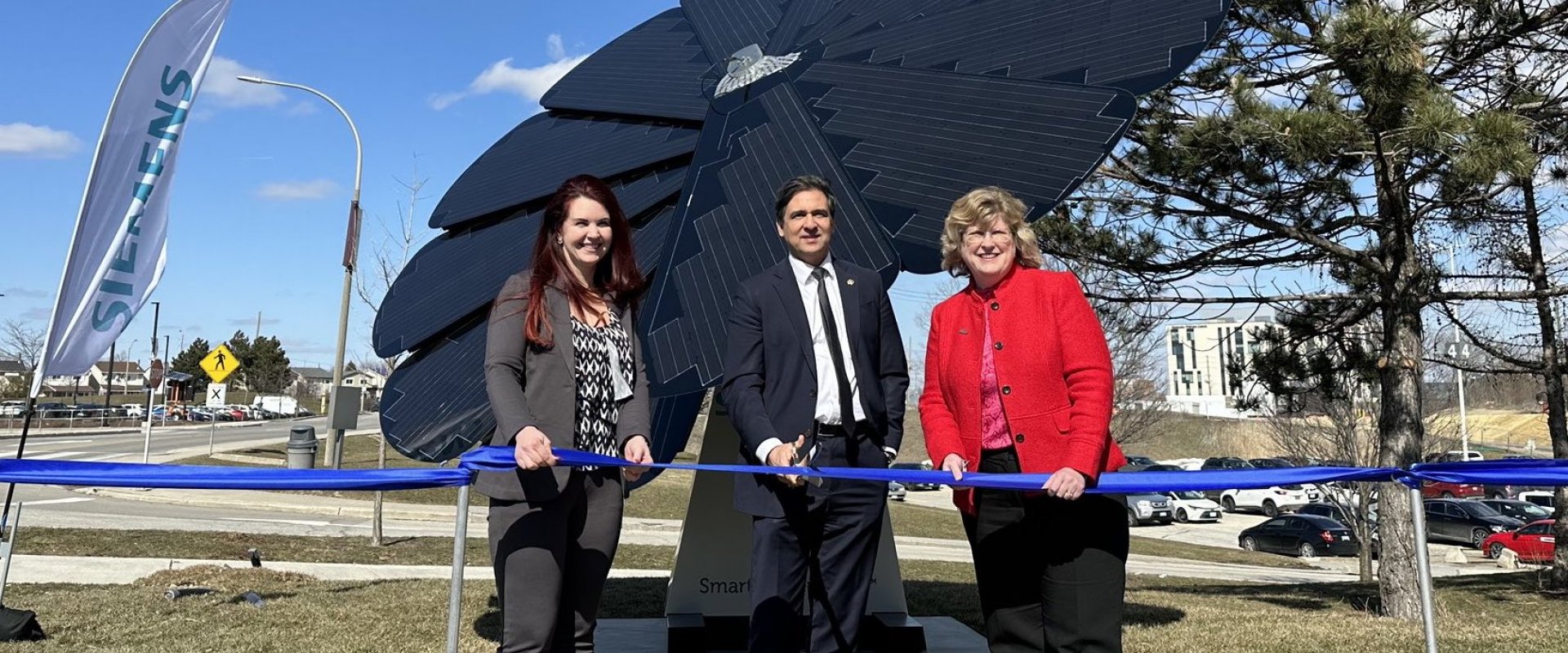Have you noticed the structure that looks like a flower outside the parking structure at North Campus and wondered what it is?
The PV Smartflower, inspired by the sunflower, is an intelligent solution to produce clean and sustainable energy. It is an innovative model with advanced photovoltaic solar panels that open, close, and follow the sun for optimal energy conversion. It uses advanced control systems to intelligently track the sun, making up to 40 per cent more energy than traditional stationary solar panels. In addition, every day at sunset, the PV Smartflower will automatically fold up and clean itself to maintain peak solar utilization.
The Humber community recently celebrated the grand opening of the PV Smartflower and the new Sustainable MicroGrid and Renewable Technology (SMART) Lab, which marks another milestone in Humber’s commitment to sustainability.
Located on the second floor of the parking structure and designed in collaboration with industry partner Siemens Canada, the SMART Lab is an innovative new Living Lab that provides an educational and experimental platform to train students and professionals on the use and control of distributed energy resources (DER) in a microgrid, renewable based generation, and reliability in electrical power supply.
The field assets of the SMART Lab comprise, but are not limited to, Battery Energy Storage Systems (BESS), Photo Voltaic (PV) Systems, Electrical Vehicle (EV) chargers, programmable loads, a DER controller for protection, and smart meters. The tasks of the microgrid are control-based algorithms programmed in the Siemens microgrid controller using secured communication channels between assets. The microgrid operation focuses on economics, reliability, and sustainability factors.
Deemed the future of energy management, microgrids are decentralized energy systems that can generate, distribute, and control electrical power. They rely primarily on renewable energy sources, such as solar, wind, hydro, tidal, geothermal, and biomass; all leading to less global warming, improved public health, inexhaustible energy, jobs and other economic benefits, stable energy prices, reliability, and resilience.
Humber students will gain a range of knowledge and professional skills related to the design, operation, and maintenance of microgrids through hands-on learning. This experience will help students better understand the complex interactions between technical, economic, social, and environmental aspects of electrical power generation. The use of the SMART Lab will contribute to students’ employability by providing knowledge in advanced metering infrastructure, grid automation and control systems, renewable energy integration, demand response and energy management, industrial communication protocols, electric vehicles chargers, energy storage, and consumer engagement.
The SMART Lab’s benefits go beyond the campus by bringing together students, faculty, and industry partners to work on real-world sustainability projects. With its training, research, and innovation activities, the SMART Lab will address the current skills gap in renewable energy management and provide future professionals with the hands-on experience in efficient electrical power transmission, quicker restoration of electricity after power disturbances, and reduced operations and management costs. The SMART Lab will serve as a platform for future applied research projects and the offering of micro-credentials in the field of microgrids and renewable energy.
Savdulla Kazazi, Ph.D., P.Eng
Program Coordinator for Electrical Engineering - Control Systems
Faculty of Applied Sciences & Technology
Shaun Ghafari, Ph.D., P.Eng
Associate Dean
Faculty of Applied Sciences & Technology



